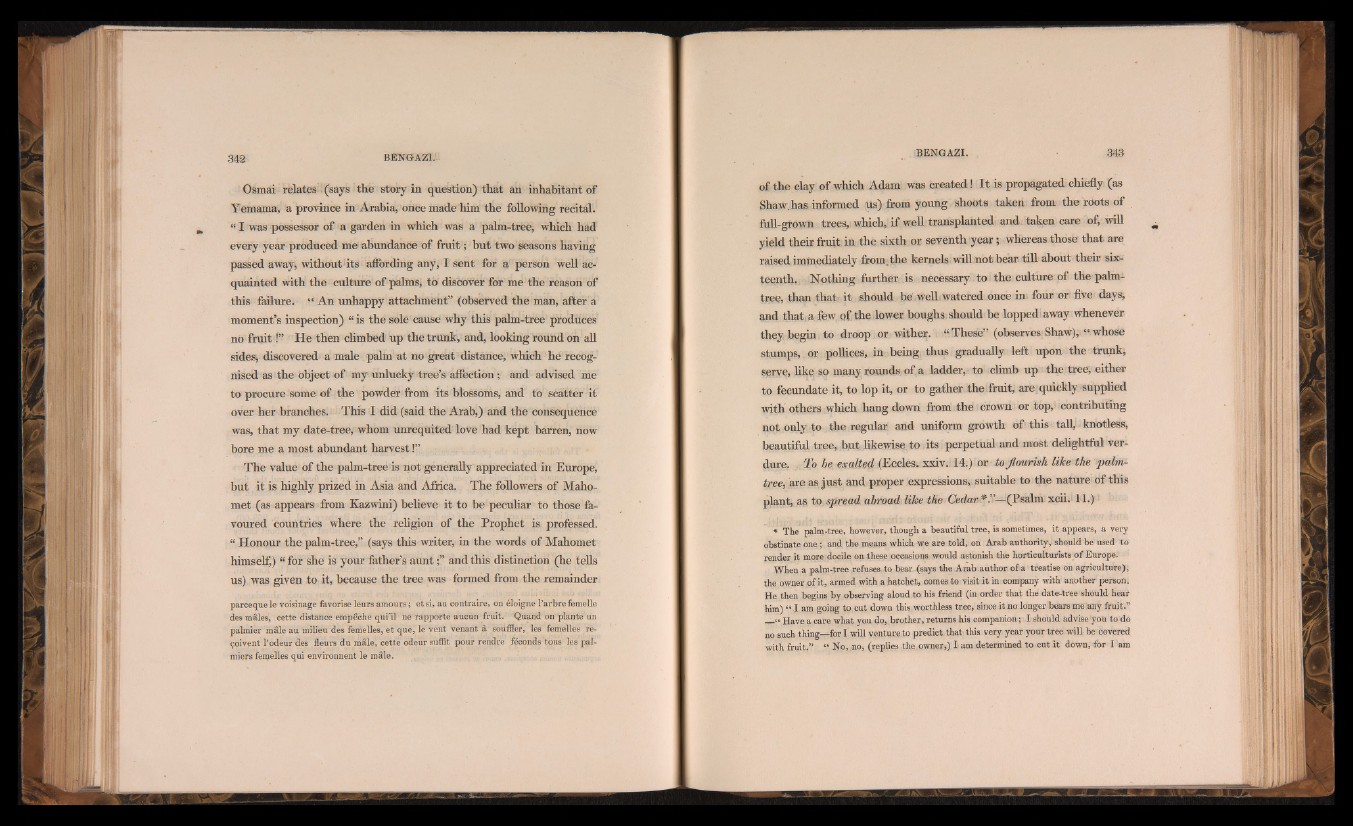
Osmai relates , (says the story in question) that an inhabitant of
Yemama, a province in Arabia, once made him the following recital.
“ I was possessor of a garden in which was a palm-tree, which had
every year produced me abundance of fruit ; but two seasons having
passed away, without'its affording any, I Sent for a person well acquainted
with the culture of palms, to discover for me the reason of
this failure, “ An unhappy attachment” (observed the man, after a
moment’s inspection) “ is the sole cause why this palm-tree produces
no fruit !” He then climbed up the trunk, and, looking round on all
sides, discovered a male palm at no great distance, which hé recognised
as the object of my unlucky tree’s affection S and advised me
to procure some of the powder from its blossoms, and tb scatter it
over her branches. This T did (said the Arab,) and the consequence
was, that my date-tree, whom unrequited lové had kept barren, now
bore me a most abundant harvest !”
The value of the palm-tree is not generally appreciated in Europe,
but it is highly prized in Asia and Africa. The followers of Mahomet
(as appears from Kazwini) believe it to be peculiar to those favoured
countries where the religion of the Prophet is professed.
“ Honour the palm-tree,” (says this writer, in the words of Mahomet
himself,) “ for she is your father’s aunt;” and this distinction (he tells
us) was given to it, because the tree was formed from the remainder
parceque le voisinage favorise leurs amours ; et si, au contraire, on éloigne l’arbre femelle
des mâles, cette distance empêche quïil ne rapporte aucun frilit. Quand on 'plante un
palmier mâle au milieu dés femelles, et que, le vent venant a souffler, lès femelles reçoivent
l’odeur des fleurs du mâle, cette odeur suffit pour rendre féconds tous les palmiers
femelles qui environnent le mâle.
of the clay of which Adam was created! I t is propagated chiefly (as
Shaw, has informed tus) from young shoots taken from the roots of
full-grown trees, which, if well transplanted and taken care of, will
yield their fruit: in, the sixth or seventh year ; whereas those that are
raised immediately from, the kernels will not bear till about their sixteenth,
Nothing further is necessary to the culture of the palm-
tree, than that it should bé well, watered once in, four or five days;
and that a few of the lower boughs should be lopped i away whenever
they begin to droop or wither. “ These” (observes' Shaw), “ whose
stumps, or polliees, in being thus gradually left upon the trunk,
sprye, like so many rounds of. a ladder, to climb up- the tree, either
to fecundate it, to lop it, or to gather the fruit, are quickly supplied
with others which hang down from the crown or top, contributing
not only to the regular and uniform growth of1 this tall, knotless,
beautiful tree, but likewise, to its perpetual and most delightful verdure,
. To le, exalted (Eccles, xxiv. 14.) or to flourish like the palm-
tree, are as just and proper expressions, suitable to the nature of this
plant, as to spread abroad like the Cedar .*.”—(Psalm xcii.'11.)’'
* The palm-tree, however, though a beautiful tree, is sometimes, it appears, a very
obstinate one ; and the means which we are told, on Arab authority, should be used to
render it more docile on these occasions would astonish the horticulturists of Europe.
When a palm-tree refuses, to bear(says the Arab author, of a treatise on agriculture),
the owner of it, armed, with a hatchet, comes to visit it in company with another person.
He then begins by observing aloud to his friend (in order that thé date-tree should hear
him) “ I am going to cut down this worthless tr.ee,.since.it no longer bears me any fruit.'’
T-“ Havea care what you do,, brother, returns his companion ; Ishould advise you to do
no such thing—for I will venture to predict that this very year your tree will be covered
with fruit.” “ No, no, (replies the owner ,) I am determined to cut i t down, for I am